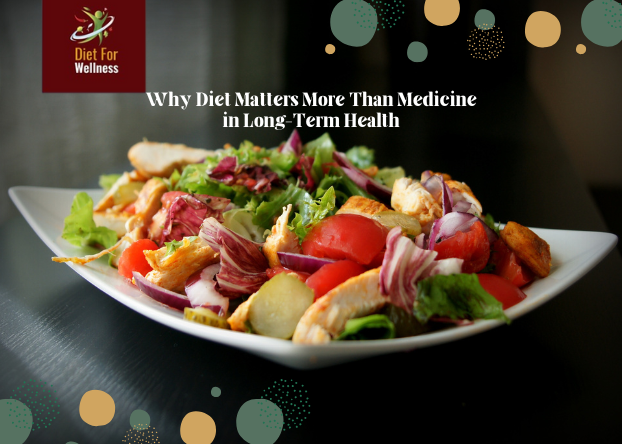Why Diet Matters More Than Medicine in Long-Term Health

Our dietary choices have a powerful influence on our overall health. Research has shown a strong correlation between dietary habits and the risk of various diseases. While some foods can contribute to chronic health conditions, others offer therapeutic and protective benefits. This has led many to view food as medicine.
How Food Nourishes and Protects Your Body
The foods we consume have a profound impact on our overall health. Nutrient-rich foods not only nourish our bodies but also protect them from various diseases.
1. The Power of Vitamins and Minerals
While our bodies require only small amounts of vitamins and minerals, they are essential for optimal health. Unfortunately, many modern diets, heavy in processed foods and light on whole foods, often fall short in these essential nutrients.
For instance, a deficiency in vitamin C can lead to scurvy, characterized by symptoms like weakness, anemia, and respiratory issues. Similarly, vitamin D deficiency, a common problem, can weaken bones and impair immune function.
2. The Protective Role of Plant Compounds
Plant-based foods, such as fruits, vegetables, beans, and grains, are packed with beneficial compounds, particularly antioxidants. These powerful substances combat cell damage, reducing the risk of chronic diseases like heart disease, dementia, and certain cancers.
3. The Importance of Fiber
Fiber, a dietary essential, promotes healthy digestion and feeds the beneficial bacteria in our gut. A high-fiber diet can protect against various diseases, reduce inflammation, and strengthen the immune system. Conversely, low-fiber diets are linked to an increased risk of conditions like colon cancer and stroke.
4. The Building Blocks of Health- Protein and Healthy Fats
Protein and healthy fats play vital roles in our bodies. Amino acids, the building blocks of protein, support immune function, muscle growth, and metabolism. Healthy fats, such as omega-3 fatty acids, help regulate inflammation and promote heart and immune health.
When you make conscious choices about the foods we eat, you are able to nourish your bodies, boost your immune systems, and protect yourselves from a wide range of health issues.
A Nutritious Diet Shields You Against Diseases
While unhealthy diets can contribute to various health problems, a diet rich in whole, plant-based foods can significantly enhance your well-being.
Research consistently shows that diets centered around plant-based foods can offer substantial health benefits. These diets, characterized by their abundance of healthy fats, whole grains, and vegetables, have been linked to reduced risks of heart disease, neurodegenerative disorders, diabetes, certain cancers, and obesity.
Beyond prevention, certain dietary approaches may even reverse existing health conditions. For example, plant-based diets have been shown to reverse coronary artery disease, while low-carb diets can help manage and even eliminate type 2 diabetes in some individuals.
Addressing Food Insecurity and Inequality
While the benefits of a healthy diet are clear, it’s important to acknowledge that access to nutritious food is not universal. Social, economic, and political factors can significantly impact a person’s ability to obtain healthy foods. Food insecurity and limited access to affordable, nutritious options can increase the risk of various health problems, particularly among marginalized populations.
The Power of Food as Medicine
The theory of “food as medicine” recognizes the huge impact of diet on health and disease.
Disease Management and Prevention
- Medical Nutrition Therapy– This evidence-based approach utilizes diet to manage and treat various diseases. For example, increasing fiber intake can help regulate blood sugar levels in individuals with diabetes, reducing the risk of complications.
- Improved Quality of Life– A well-balanced diet can alleviate symptoms and enhance overall well-being. For example, a modified Mediterranean diet has been shown to reduce pain and fatigue in individuals with lipoedema.
- Reduced Healthcare Costs– By preventing and managing chronic diseases, a “food as medicine” approach can potentially lower healthcare costs.
- The Limitations and Considerations
While “food as medicine” offers significant benefits, it’s important to acknowledge its limitations
- Not a Cure-All- While diet plays a crucial role in health, it cannot solely address complex health issues like genetic predispositions or autoimmune disorders.
- Misinformation and Unverified Claims- Social media can be a breeding ground for misinformation, leading to unhealthy dietary practices and potentially harmful outcomes.
- Drug-Nutrient Interactions– Certain foods can interact with medications, either enhancing or diminishing their effects. It’s essential to consult with healthcare professionals to ensure safe and effective use of both food and medication.
To maximize the benefits of “food as medicine,” it’s important to work closely with healthcare providers. When medical expertise is combined with dietary guidance, individuals can achieve best health outcomes.
